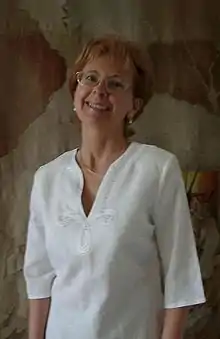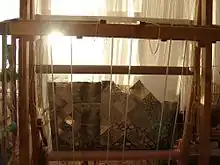Éva Farkas
Éva Farkas (born March 15, 1960 in Nagykanizsa) is a Hungarian tapestry artist.
Éva Farkas | |
|---|---|
 | |
| Born | 15 March 1960 |
| Nationality | Hungarian |
| Education | Hungarian University of Applied Arts |
| Known for | tapestry, graphics |
Biography

Éva Farkas was born 15 March 1960, in Nagykanizsa. She graduated from the Technical College of Art in Pécs in 1978, where her Arts teacher was the painter Valkó László, her Textile teacher was Bizséné Kovács Diana. She graduated from the Hungarian University of Applied Arts as a tapestry artist in 1984. Her Masters: Kádár János Miklós, Szabó János, Plesnivy Károly, Szilvitzky Margit and Polgár Csaba.
Since 1984 she is a member of the National Association of Hungarian Creative Artists (Magyar Alkotóművészek Országos Egyesülete-MAOE) and also has a membership in the Association of Hungarian Fine and Applied Artists (Magyar Képző- és Iparművészek Szövetsége) since 1991 and the Association of Hungarian Tapestry Artists (Magyar Kárpitművészek Egyesülete) since 1996 /She was one of the designers and weavers of the gobelins “Tapestry Without Limits” and “Saint Stephen And His Work”/. Since its establishment (1998) she is a charter member of the Applied Arts Workshop in Gödöllő, which is the descendant of the famous Gödöllõ Colony of Artists (founded by Aladár Körösfői-Kriesch). The artist often exhibit with other members of the workshop both in Hungary and abroad. She ran a drawing course until 2005 in the Creative House. She give account of her independent artistic activity at individual and grouped exhibitions.
Personal life
She has two children: Nóra (born in 1987) and Zsolt (born in 1990).
Ars poetica
"Throughout the first 16 years of my career, nature was the primary theme of my artwork. My tapestries were prepared with the techniques of classical French gobelins, with dense spacing of the wrap, applying hachure, and delicate transitions of subtle colors. “Castle-Resonance”, an exhibition in Gödöllő, inspired me to turn my work to a different artistic direction. The compelling themes of Castle Resonance encouraged me to experiment with unconventional materials providing a new dimension to my artwork. During this period, I completed “Find 2000”, a work that inspired a chain of ideas that continued to dominate my future designs. Since then, I remain captivated by the idea of contrasts, particularly, the contrasts between various textures, rustic and fine surfaces, and various materials; the fine and detailed goblin in opposition to sackcloth together on tapestry; silk versus linen; weaving hemp-yarn against gold threads or wool and silk threads simultaneously to create a drastic, yet astonishing effect within each individual piece. While working on this new stylistic effect, I also became interested in thematic elements associated with Eastern cultures and religions, and these novel themes became apparent in my work. Presently, I am mainly focusing on the design of praying-rugs which I named the “Sacred Tapestries”. So far, six individual pieces have been completed. They were woven with an interesting and difficult technical approach using wool, linen or silk on every second weft. In my artwork I combine the Eastern and Western culture by incorporating the motives from the oriental rugs. With my “Sacred Tapestries” I would like to send a message that transcends cultural, racial and religious barriers."
Exhibitions
Individual
- 1984.Schoolgallery, Dunakeszi
- 1985.Radnóti M. High School, Dunakeszi
Csokonai V.M. High School, Csurgó - 1986. Town Council, Göd
- 1991.József Attila Culture Centre, Dunakeszi
- 1992. Town-hall, Casalgrande, /Italy/
- 1993. Youth Centre, Fót
Ferencváros Cellar Exhibition, Budapest - 1997. Town Library, Dunakeszi
- 1998. Music School, Dunakeszi
- 2001.Town-hall, Casalgrande, /Italy/
- 2001.Culture Centre, Nagyatád
- 2003. Red Gallery, Dunakeszi
- 2005.Keve Gallery, Ráckeve
- 2007.Gigant Kunst Im Palais, Wien
House of Culture, Erdőkertes - 2008. Hotel Manréza, Dobogokő
Voglauer, Vác - 2010. Hotel Azúr, Siófok
Grouped
- 1986. Town library, Dunakeszi
- 1988. IDEA Exhibition, Dubai, Trade Center (Kuwait)
Wall- and Spacetextile Biennale, Szombathely
Kozma Lajos Scholar's Exhibition, Museum of Applied Arts (Budapest) - 1989. FIS Exhibition, Pécs, Kalocsa
Kozma Lajos Scholar's Exhibition, Museum of Applied Arts (Budapest)
“Five Years of the Rózsa Anna Prize”, Savaria Museum, Szombathely, Vigadó Gallery, Budapest - 1990.“Hungarian in Sweden”, Österbybryks
Kozma Lajos Scholar's Exhibition, Museum of Applied Arts (Budapest) - 1991. Ferenczy Memorial Exhibition, Vigadó Gallery, Budapest
- 1993. FISE, Ferencváros Cellar Exhibition
Csók István Gallery, Buda Castle Old Tower, Budapest
“Living Gobelin”, GödöllőGallery - 1994. FISE Exhibition, Budapest Gallery, Budapest, Pozsony
- 1996. XIV. Wall- and Spacetextile Biennale, Szombathely
- 1997.“Living Gobelin”, Gödöllő Gallery
“Picture tapestries”, Eger
“Pelso '97” Balaton Museum, Keszthely
“Raisings”Stefania Palace, Budapest
Szirák, Hotel Castle - 1998. Fehérvár Parlour, Székesfehérvár
“Silence”, Vigadó Gallery, Budapest - 1999.“Light”, Applied Arts Workshop, Gödöllő
- 2000.“Castle-resonance”, Applied Arts Workshop, Gödöllő
- 2001.“The art of setting and bestowal”, Podmaniczky Palace, Budapest
“Applied Arts”, Kunsthalle, Budapest
“Experience and ideal”, Gödöllő, Royal Castle
“Pelso”, Keszthely, Balaton Museum
“Garden”, Applied Arts Workshop, Gödöllő
“Drawings, plans”, Gallery IX., Budapest - 2002.“Garden in the city”, Budapest, Association of Hungarian Fine and Applied Artists
MKE Exhibition, United Nations Headquarters, Genf - 2004.“Women at the Gödöllő Artist's Colony”School of Art Machintosh Gallery, Glasgow
“Vexillum Hungaricum”, Turnhout /Belgium/
“GIM-garden”, Volksbank Hungary, Budapest
“Green”GIM, Gödöllő
GIM Exhibition, Contemporary Hungarian Gallery, Dunaszerdahely - 2005.”Garden of Atlantis”GIM, Gödöllő
Contemporary Artists' Exhibition, Csók Gallery, Budapest
“Music and Fine Arts”, Farkas Ferenc Art School, Dunakeszi - 2006.“Garden of Secrets”, Gödöllő, GIM
“Solstice”Association of Hungarian Fine and Applied Artists, Budapest - 2007. MAOE Scholar's Exhibition, Olof Palme House Bp.
Hungarian Workshop of Artists, Szentendre
Galerie grenzArt, Hollabrunn, Austria - 2008. International Workshop, Senta, Serbia
Hungarian Gobelin, Debrecen - 2009. PELSO, Keszthely
Transmission, Gallery, Hatvan
Japanese-Hungarian Contemporary Exhibition
Awards
- 1981-83. Scholarship of the Hungarian People's Republic
- 1987-90. Kozma Lajos Scholarship
- 1987. IDEA Prize
- 1988. Biennale Prize, X. Wall- and Spacetextile Biennale
- 1992. FISE Scholarship
- 1996. Biennale Prize for the collective gobelin “Tapestry without limits”
- 2004. Prize of the Ministry of National Cultural Inheritance's Art Department (Vexillum Hungaricum), Turnhout (Belgium)
- 2006. Prize of the Association of Hungarian Fine and Applied Artists
- 2009. First Prize of the Ministry of Education and Culture Pelso
References
- Keserű Katalin: Women at the Gödöllô Artists’Colony. The Home. Women at the Gödöllô Artists’Colony. London,Hungarian Cultural Centre, 2004. 6–10., 18–23.
- Applied Arts Workshop in Gödöllő
- www.mkisz.hu
- Profile on artportal.hu
- SZÉCHENYI L.: ~ (kat. előszó, Savaria Múzeum, Szombathely, 1990)
- Kortárs Magyar Művészeti Lexikon I-III. Enciklopédia Kiadó, 2001, főszerk. Fitz Péter
- Kunst erleben-Galerie grenzArt, Hollabrunn, Austria video
- www.art-nouveau.hu
- Torday Alíz: Farkas Éva; Fürge Ujjak; 2002. 2.szám, február; 66-67.
- Jankovich Júlia: Az újjászületett GOBELIN; Balassi Kiadó, Budapest; 2001; 26-28.; ISBN 963-506-416-0
- A gödöllői szőnyeg 100 éve. Főszerk.: Őriné Nagy Cecília. Gödöllői Városi Múzeum, Gödöllő; 2007; 61-62. ISBN 978-963-86659-5-9
- Wehner Tibor: A jelenkori gödöllői textil. In: A gödöllői szőnyeg 100 éve - Tanulmányok a 20. századi magyar textilművészet történetéhez. Főszerk.: Őriné Nagy Cecília. Gödöllői Városi Múzeum, Gödöllő; 2009; 102-105. ISBN 978-963-87880-2-3
- Handbook of Pest County. Ceba Kiadó; 1998; 299.